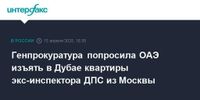The Russian Prosecutor General's Office has taken a significant step in its ongoing efforts to combat corruption by appealing to the authorities in the United Arab Emirates (UAE) for the confiscation of five luxury apartments in Dubai owned by a former Moscow traffic police inspector, Sergey Kuznetsov. This request highlights the increasing international cooperation in the fight against financial crimes and the recovery of illicitly acquired assets.
On April 15, 2025, during a meeting in Abu Dhabi with Humaid Obaid AbuShibs, the head of the UAE's Financial Intelligence Unit, Prosecutor General Igor Krasnov shared insights into Russia's approach to confiscating assets whose acquisition cannot be legally justified. "I shared our experience in confiscating property into state revenue where the legality of the sources of acquisition is not confirmed by officials. One such claim has been made against a former Russian police officer who owns five apartments in Dubai worth over 3 million dirhams," Krasnov stated.
This move is part of a broader strategy by the Russian government to recover funds and properties believed to have been acquired through corrupt practices. The investigation into Kuznetsov, who was previously convicted, revealed that he and his relatives amassed a substantial portfolio of over 20 properties during his tenure in the traffic police, now known as the State Traffic Inspectorate.
According to reports from Interfax, the Lefortovo District Court in December 2022 approved the Prosecutor General's request to seize assets and funds amounting to approximately 180 million rubles (around $2.4 million) from Kuznetsov. This court ruling underscores the seriousness of the allegations against him and reflects the Russian judiciary's commitment to addressing corruption.
During his service, Kuznetsov, along with family members and trusted associates, acquired not only real estate but also vehicles. Additionally, significant amounts of cash were discovered in bank storage facilities linked to him. However, Kuznetsov has failed to provide any documentation or evidence proving the legality of the funds used for these acquisitions.
The implications of this case extend beyond individual accountability; they also signal a shift in how nations are collaborating to address corruption on a global scale. Krasnov's appeal to the UAE authorities is a testament to the importance of international partnerships in tracking down and reclaiming assets that have been hidden or moved across borders.
As the Russian government intensifies its crackdown on corruption, cases like that of Kuznetsov serve as a warning to others in positions of power. The message is clear: illicitly acquired wealth will not be tolerated, and efforts will be made to ensure that such assets are returned to the state.
The appeal for the confiscation of Kuznetsov's properties is also timely, given the growing scrutiny on financial transactions and the sources of wealth among public officials. With increasing public demand for transparency and accountability, governments are under pressure to take decisive action against corruption.
Moreover, the collaboration between Russia and the UAE reflects a broader trend where nations are recognizing the need for joint efforts in combating financial crimes. This partnership is particularly crucial in a globalized economy where assets can easily be transferred across borders, making it challenging for any single country to tackle corruption alone.
In conclusion, the request for the confiscation of five apartments owned by Sergey Kuznetsov is not just a legal maneuver; it is a part of a larger narrative on the fight against corruption. As Prosecutor General Krasnov noted, the experience shared with the UAE authorities may pave the way for more effective measures in recovering state assets. The outcome of this case could have significant implications for future efforts to hold corrupt officials accountable and restore public trust in government institutions.





